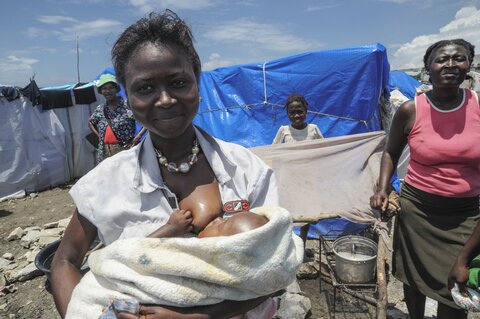Around the world in 1,000 days

Fact: Undernutrition is at the root of nearly half of all deaths in children under 5.
Fact: Malnutrition during pregnancy and early life can lead to learning difficulties, vulnerability to disease, and lower future earnings.
Fact: Good nutrition during pregnancy and through a child's second birthday — the ‘first 1,000 days' — kickstarts their physical and brain development, giving them the best start in life.
Seven mothers and one father from very different countries and contexts explain how they try to ensure the best chances for a healthy, happy future for their children throughout this critical period.
Pregnancy — the building blocks for a healthy new life

Raida, Philippines
In the southern province of Maguindanao, Raida Gapor, six months pregnant, is a regular at the local health clinic where she gets support from the World Food Programme (WFP) on healthy eating habits as well as advice on childbirth and how to take care of a baby.
"I visit the health centre several times throughout the month, but there are weeks where I visit more than others. It really depends on how I feel. I'm really careful this time, because I've already lost a child. It was years ago. My daughter was very malnourished. Even at the age of 2, she couldn't walk and she was frail. She really didn't weigh much.
"I feel a difference — my baby is healthy and kicking"
Since visiting the health centre and joining the WFP nutrition support programme, I've noticed that my appetite is much healthier. I have also gained more weight compared to my first pregnancy. I have learned to eat only what is good for my baby and myself: vegetables, fruits and fish are the staples for me right now.
I haven't seen my child yet, but I feel different. I feel a difference — my baby is healthy and kicking. Looking back at my first pregnancy, I couldn't feel much movement inside my womb and I was always in low spirits."
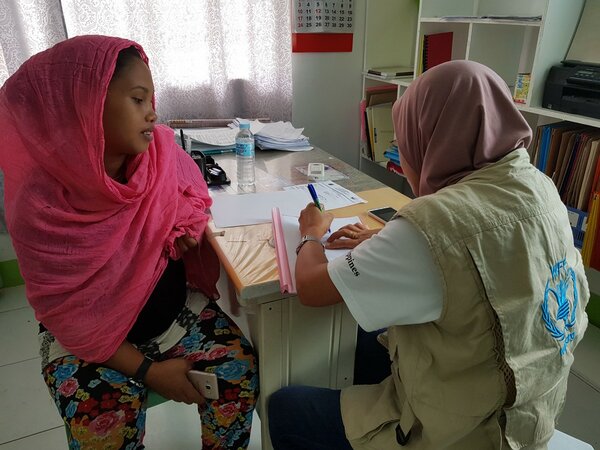
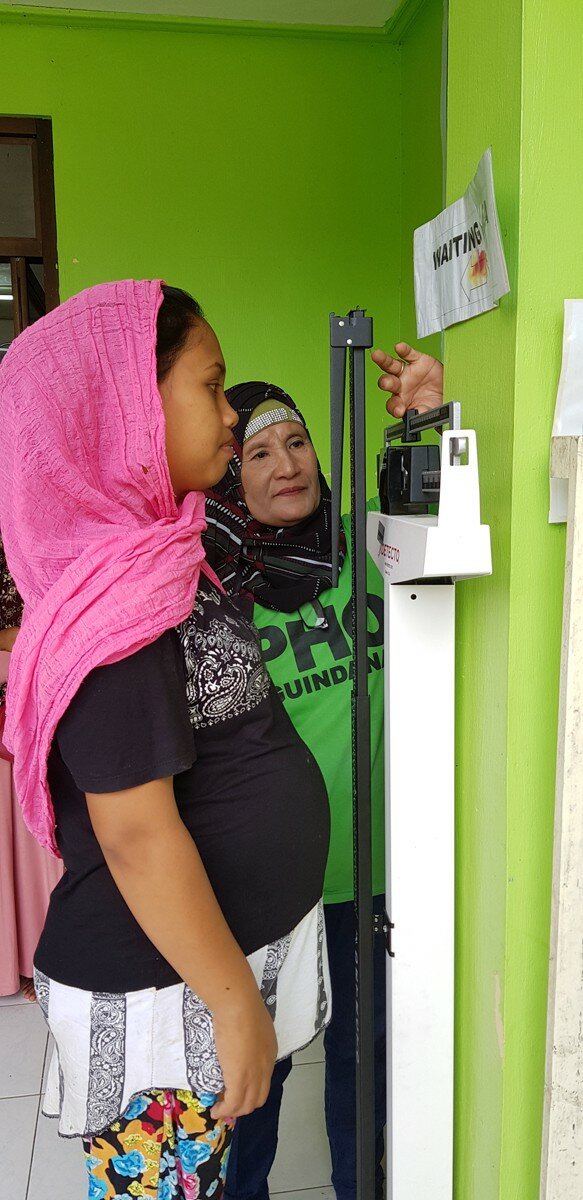
Elizabeth, Tanzania
Mother-of-five Elizabeth also sees a difference between her pregnancies before and after she joined the WFP-supported Boresha Lishe — ‘better nutrition' in Swahili — programme in her native Dodoma province. Seven months into her sixth pregnancy, Elizabeth walks two hours to the local clinic, where a small number of staff — a nurse, a midwife and a medical student — aided by one member of the local community take care of hundreds of women and children every week.

"My first three children were not part of this programme and I can see the difference between them and the ones who were," says Elizabeth. At the clinic, she receives fortified porridge which contains the nutrients she needs to support the development of her baby during the critical months of her pregnancy. "I like the porridge — it tastes better than the regular one," she adds.
Nurse Belina, who has been at the clinic for nine years, says that without this food, many of the babies would be underweight, but thanks to WFP's support most of the babies are weighing in at 4 kg.
Breastfeeding — giving babies the best start in life
Nikita, UK
"My mother and mother-in-law gave birth in the UK when formula was heavily pushed onto them, so they did not breastfeed. But I always knew I wanted to breastfeed. Coming from the Indian heritage and having grown up in India, it was normal for me to see aunts and cousins breastfeed their babies and sometimes even children as old as 5!

It is the most natural sentiment of motherhood. I also knew breastfeeding would give my babies antibodies that would protect them from various illnesses. I wanted to give my babies the best start in life, and what better way to do it than breastfeeding?"
Anastácia, Timor-Leste
"I encourage all mothers to breastfeed their children until they reach the age of 2. After birth, I carried my babies everywhere with me and ensured we connected through breastfeeding: that is the first love shared between a mother and her child.
When I gave birth to our third son eight months ago, my husband was the one cooking, washing clothes, preparing warm water for my bath and supporting me around the house. I really appreciate that."
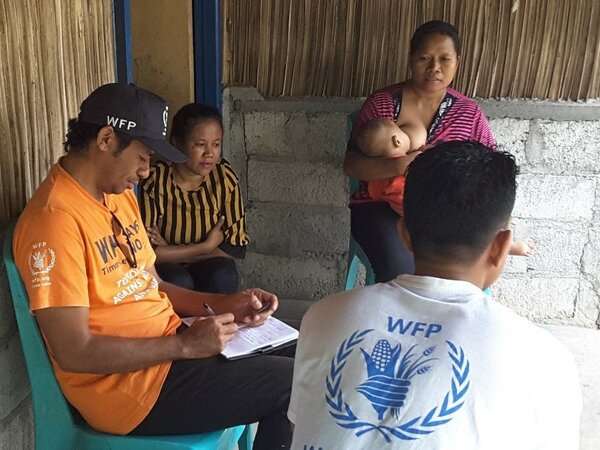
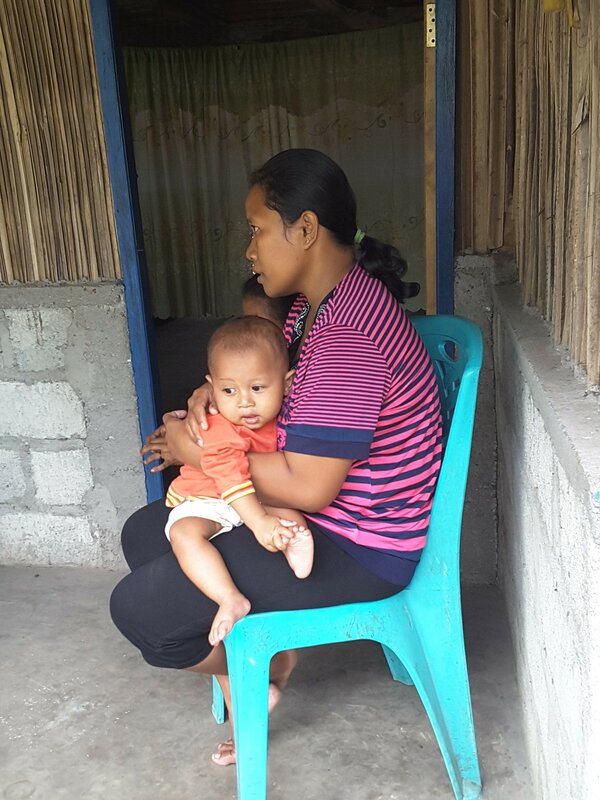
A very important ingredient: fathers
Back in London, Nikita echoes Anastácia's words: "I am lucky to have a very supportive, caring husband. He makes sure I am fed and rested. He lets me lie in every morning while he takes care of the kids! Without his support I don't think I would be a very happy, breastfeeding mummy!"
Alick, Malawi
Malawian father Alick can only agree: "I learnt lessons in raising my first child. My wife was overwhelmed with household chores and taking care of the child — exclusive breastfeeding was a challenge. As a result, the child was malnourished."

Now I help my wife with most household chores and taking care of children, so that she has enough rest and time to exclusively breastfeed our baby."
From breast to spoon — introducing nutritious food
Petronila Antonia, Guatemala
"For the first months I only fed my daughter, Luna, breast milk — while I was pregnant I attended counselling groups supported by WFP and learned that this was good for the growth and health of my baby. She is 8 months old now and she hardly ever gets sick, she is super healthy!

Now I prepare different types of foods for her, always trying to make her meals healthy and nutritious. For example, I give her potatoes, fruit, beans and eggs. I plan to keep breastfeeding Luna until she turns 2 — she likes it a lot. I learned a lot with the support groups and realized that it is very important to keep learning."
Across the border in El Salvador, mother-of-three Yojana feeds her youngest son, José, nutrient-rich fortified cereals that she receives through the WFP-supported Nutrimos El Salvador programme.
Yojana, El Salvador
Across the border in El Salvador, mother-of-three Yojana feeds her youngest son, José, nutrient-rich fortified cereals that she receives through the WFP-supported Nutrimos El Salvador programme.
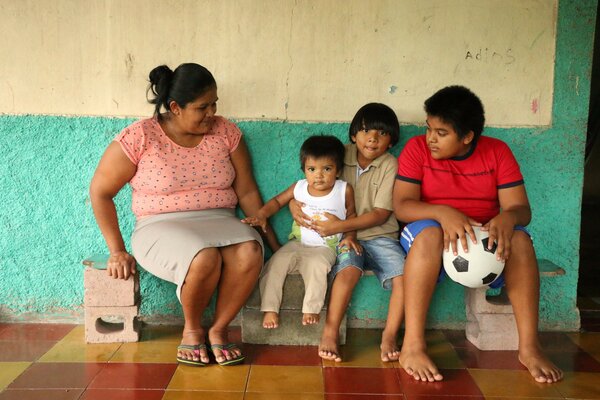
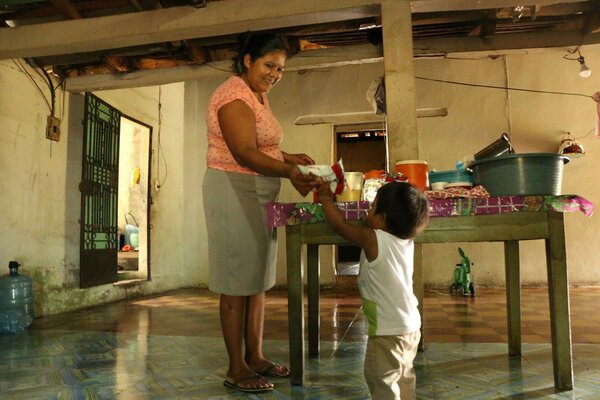
"I have three children and my youngest one, José, who is 1, is having the cereals from the programme. I blend them in juices and porridge and I can see they do him a lot of good. I can see the difference this makes — he has gained weight and he is growing well.
I also took the fortified cereals after the third month of my pregnancy and thanks to my good nutrition José was born healthy and strong."
Mothering in times of emergency
The support that is so important to many — if not all — mothers becomes particularly vital in the case of emergencies like conflict, displacement or natural disasters.
Alaa, Syria
"I was quite weak after giving birth and my breast milk was not sufficient for Aboud. I could tell he was not growing properly," says Alaa who had to leave her her home in a rural village near Deir Ezzor after years of siege and bombardment. "I had to feed my baby sugary water to make up for the lack of milk. I couldn't produce enough milk for him, I was too hungry."

After she moved to the border town of Ya'roubiyah, one of her neighbours told her about a WFP-supported children's nutrition clinic. "I have nothing to lose, I thought. And, with the treatment we both received, I have gained so much." The local doctor diagnosed Alaa and her baby Aboud with malnutrition, giving them both nutrition supplements. "Before finding WFP's clinic, I had tried several private ones but I could not afford the doctor's fees. I feel this clinic has saved my life and that of my son."
Ayesha, Bangladesh
Ayesha, her husband and three children aged 5, 4 and 5 months fled Myanmar to find safety in refugee camps in Cox's Bazaar, Bangladesh. "We are happy here, but we can not eat well, we do not get fish or spices. As we can not work here, we do not have any money, so we can not buy anything.

Before getting cereals from WFP, I was very weak and my baby daughter, Kafin Ara, used to feel sick every now and then. She was very thin, suffering from malnutrition. Once I started having these cereals, I started to feel more energetic. And as I breastfeed Kafin Ara, she is also getting healthier. She doesn't fall sick like before and she has gained weight. I feel so happy to see her healthy."
In 2017, WFP reached 5 million pregnant and breastfeeding women and 5.9 million children aged between 6 months and 2 years with malnutrition treatment and prevention programmes.
Based on contributions by Marwa Awad, Badre Bahaji, Denita Baptista, Anthony Chase Lim, Gabriela Cladellas, Irina Ruano, Shelley Thakral, Francis Thawani, Nina Valente and Max Wohlgemuth.
Breastfeeding can be the difference between life and death
